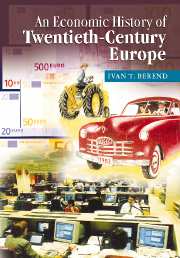 An Economic History of Twentieth-Century Europe
An Economic History of Twentieth-Century Europe Book contents
- Frontmatter
- Contents
- List of boxes
- List of figures
- List of tables
- Acknowledgments
- Introduction
- 1 Europe's laissez-faire system and its impact before World War I
- 2 Decline of laissez-faire and the rise of the regulated market system
- 3 Economic dirigisme in authoritarian–fascist regimes
- 4 The centrally planned economic system
- 5 Mixed economy and welfare state in an integrated post-World War II Western Europe
- 6 Globalization: return to laissez-faire?
- Bibliography
- Index
Introduction
Published online by Cambridge University Press: 05 June 2012
- Frontmatter
- Contents
- List of boxes
- List of figures
- List of tables
- Acknowledgments
- Introduction
- 1 Europe's laissez-faire system and its impact before World War I
- 2 Decline of laissez-faire and the rise of the regulated market system
- 3 Economic dirigisme in authoritarian–fascist regimes
- 4 The centrally planned economic system
- 5 Mixed economy and welfare state in an integrated post-World War II Western Europe
- 6 Globalization: return to laissez-faire?
- Bibliography
- Index
Summary
Looking back over the twentieth century, one may imagine Charles Dickens's feelings when he reflected on the bloody ending of the eighteenth century. He opened his 1859 A Tale of Two Cities with the words: “It was the best of times, it was the worst of times, it was the age of wisdom, it was the age of foolishness, it was the epoch of belief, it was the epoch of incredulity, it was the season of Light, it was the season of Darkness, it was the spring of hope, it was the winter of despair …”
Indeed, as Sir Isaiah Berlin expressed it, the twentieth century was the most horrible century of Western history. Eric Hobsbawm characterizes it as the Age of Extremes, “a sort of triptych or historical sandwich: a quarter of a century of a ‘Golden Age’ between two, equally long periods of catastrophes, decomposition and crisis” (Hobsbawm, 1994: 1, 6). Mark Mazover gave the provocative title Dark Continent to his book on Europe's twentieth century, which “brought new levels of violence into European life, militarizing society … killing millions of people with the help of modern bureaucracies and technologies” (Mazover, 1998: 404).
The twentieth century, nevertheless, radically changed Europe and the life of its peoples in a positive way. A person could produce ten times more value in an hour by the year 2000 than a century before.
- Type
- Chapter
- Information
- An Economic History of Twentieth-Century EuropeEconomic Regimes from Laissez-Faire to Globalization, pp. 1 - 9Publisher: Cambridge University PressPrint publication year: 2006


